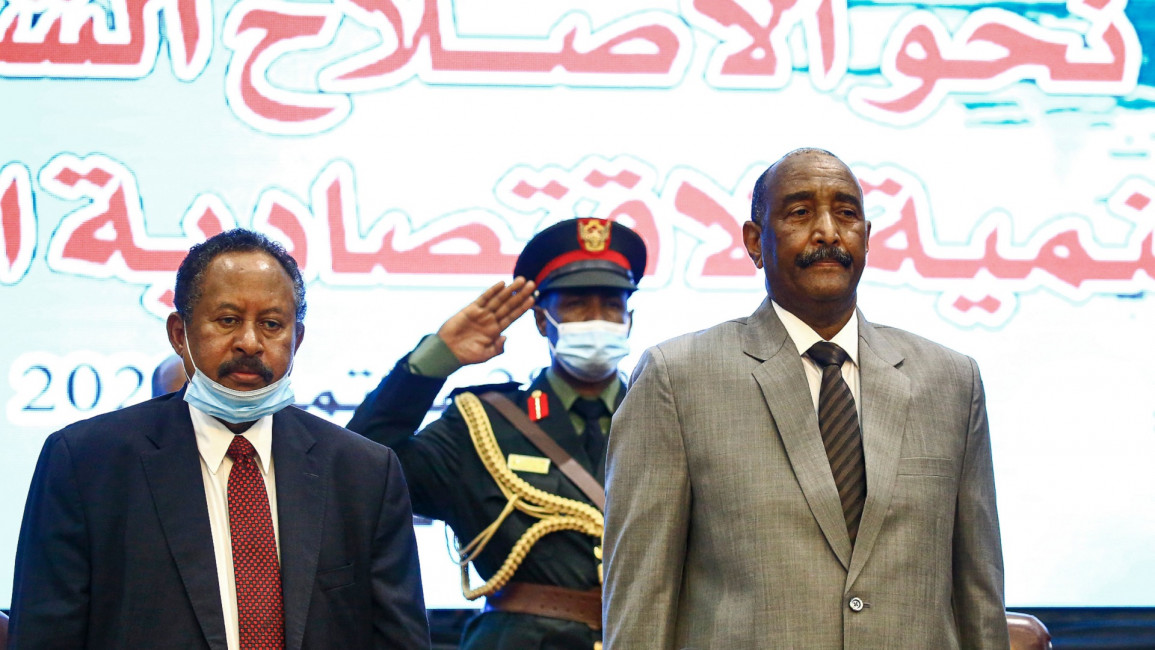Israeli delegation visited Sudan in push to normalise ties
An Israeli delegation has visited Sudan to discuss normalising relations following Israel's US-brokered deals with the UAE and Bahrain, sources in Khartoum and Jerusalem said on Thursday.
The one-day return trip on Wednesday has heightened speculation that Israel could soon strike a peace deal with Sudan, an Arab country with which it is still technically at war.
US President Donald Trump, fighting for re-election on November 3, has pushed for further deals between Israel and Arab countries with which it currently has no diplomatic relations.
A chartered plane left Tel Aviv for the Sudanese capital on Wednesday, according to the specialised air traffic website Flightradar24.
Sources in Sudan and Israel confirmed to AFP that the visit had taken place on Wednesday.
"A joint American-Israeli delegation visited Khartoum yesterday" and met with Sovereign Council president General Abdel Fattah al-Burhan for talks on a normalisation of ties between Sudan and Israel, a Sudanese government source said.
Israeli sources requesting anonymity had earlier told AFP that an Israeli delegation had travelled to Sudan on Wednesday to discuss the same issue.
Read also: Normalisation deal with Netanyahu would betray Palestinians, along with Sudan's refugees in Israel
The same day, US Secretary of State Mike Pompeo said he hoped Sudan would "quickly" recognise Israel.
And on Thursday the US State Department said Pompeo had spoken by phone with Sudanese Prime Minister Abdalla Hamdok during which he "applauded... Hamdok's efforts-to-date to improve Sudan's relationship with Israel and expressed hope that they would continue".
That call came after Trump had pledged Monday to take Sudan soon off the US state sponsors of terrorism blacklist, a legacy of the era of fallen dictator Omar al-Bashir.
Israel's top-selling daily, Yediot Aharonot, reported that Sudan's post-Bashir joint civilian-military government had internally agreed to normalise ties.
"According to reports that have been received in Jerusalem, the leadership in Khartoum has made a decision in principle to that effect," the newspaper said.
'Very close'
It reported that "an agreement has been reached" between Burhan and Hamdok "who had been opposed up until now to normalising relations with Israel".
|
|
The newspaper mentioned a possible announcement by Trump "in the coming days" from Washington, with Israeli Prime Minister Benjamin Netanyahu and Burhan to join by video conference.
As the reports emerged, Sudan's veteran opposition leader Sadiq al-Mahdi of the National Umma Party cried foul.
In a statement, he rejected any move to normalise ties with Israel, calling it "treason" and unlawful, and added that his party would file a lawsuit against the authorities and stop its support of the government.
Netanyahu and Burhan in February held a landmark meeting in Uganda.
Israeli intelligence minister Eli Cohen was also quoted in local media as saying Israel was "very close to normalising ties with Sudan," in comments his foreign affairs advisor Arye Shalicar confirmed to AFP.
Sudan experienced a historic shift last year as Bashir was ousted in April in the face of youth-led street protests.
It has launched a series of reforms, put Bashir on trial and is cooperating with the International Criminal Court to try him over his regime's military campaign in the Darfur region.
Sudan is one of four country designated by Washington as a state sponsor of terrorism, along with Iran, North Korea and Syria.
The designation severely impedes access to loans, foreign investment and debt relief.
Sudan 'on its knees'
Sudan was designated in 1993 during the rule of Bashir, who had imposed a brand of political Islamism on the country and briefly allowed Osama bin Laden to stay in the country.
Trump said he was ready to remove Sudan from the blacklist after Khartoum agreed to a $335 million compensation package for victims and relatives of past attacks.
Pompeo had discussed the issue of normalising ties with Israel in August on the first visit in 15 years by a top US diplomat to Khartoum.
But Hamdok at the time demurred on the controversial step, saying the transitional government did not have authority to normalise with Israel.
The diplomatic pressure on Sudan, one of the world's poorest countries, comes at a time it has been hit by a tanking economy, rising prices and natural disasters.
"The Sudanese can't take it anymore. Floods, inflation, power cuts: the country is on its knees and the government is powerless," said Marc Lavergne, a Sudan specialist at the French National Centre for Scientific Research.
The Brookings Institute, a Washington-based think-tank, warned recently that the debate about Israel ties "has ignored the fragility of Sudan's political transition".
It warned that "if normalisation is seen as resulting from exploitation of Sudan's economic and humanitarian desperation, it will be even more polarising among the public (and) accelerate the erosion of support for the transition".
Follow us on Facebook, Twitter and Instagram to stay connected



